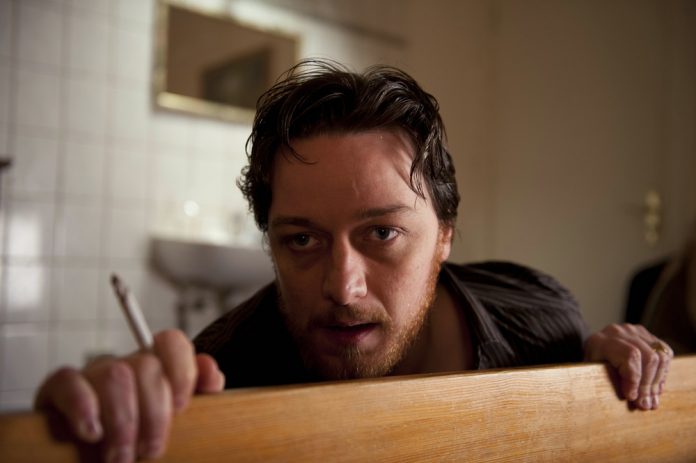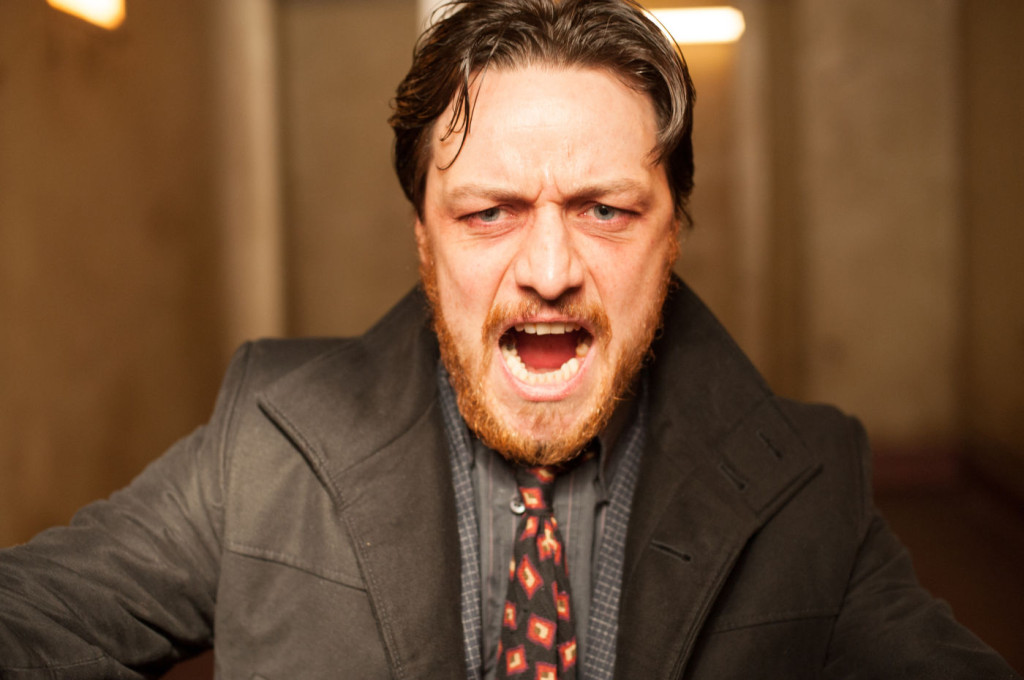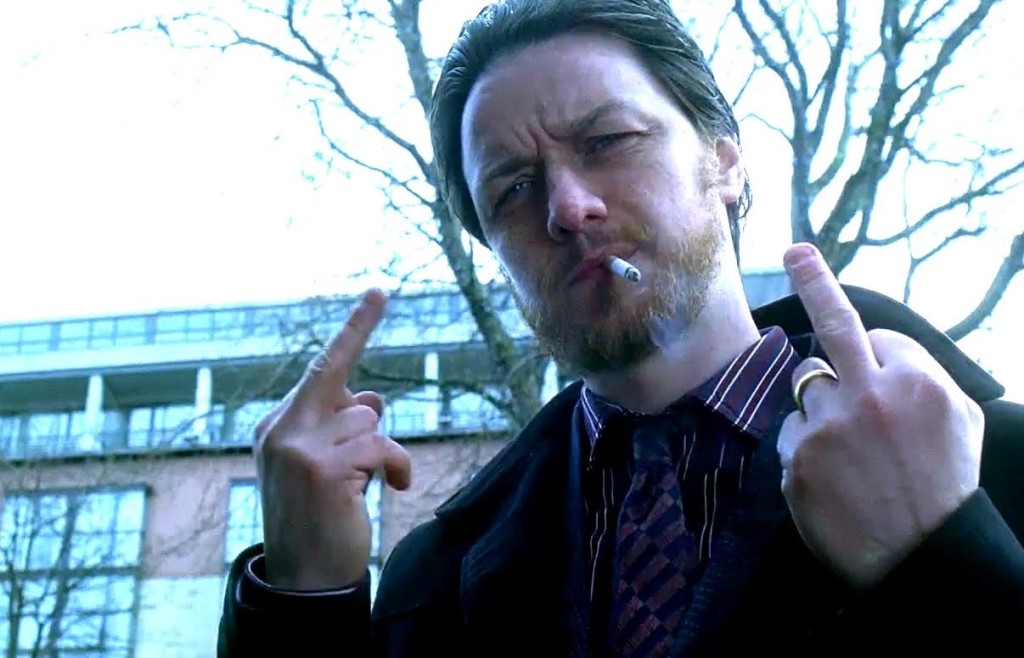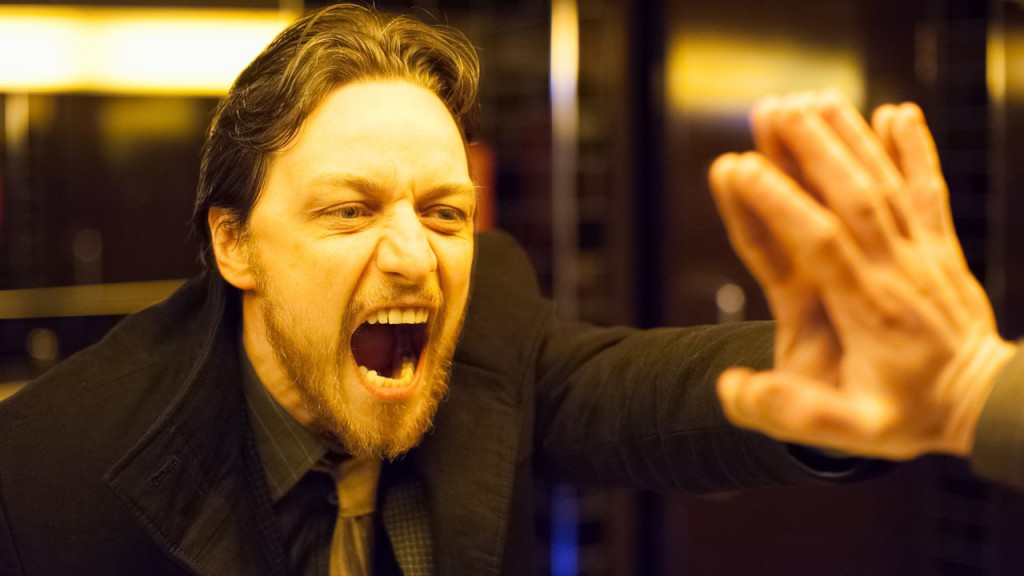
We had a chance to interview James McAvoy about what might very well be the role of his career. In Filth, the talented Scotsman plays Bruce Robertson, a morally corrupt, cocaine-snorting, boozing, manipulative and violent Scottish cop, who would do anything to be promoted, which is includes, but is not limited to, playing his colleagues against one another and sleeping with their wives. Oh and he’s an Irvine Welsh creation too, the best one to come on screen since the boys of Trainspotting. In our interview McAvoy tells us about how surprisingly easy it was for him to get into the state of mind of his character and how this film affected his own sense of humor and behavior and. He also talks….baking.
______________________________________________________________________________________
Filmfutter: With Trance, Welcome to the Punch and Filth you went to some really dark places this year.
James McAvoy: Yeah
FF: You haven’t done a lot of that before.
JM: It has been a whole year of darkness. And “Macbeth”, on stage, was probably the darkest of all of them. I don’t know why it happened. It’s not necessarily what I‘ve been looking for; it’s what came my way. Maybe it has something to do with the age that I’m at. It means that you get more existentially interesting scripts. I am 34. When you’re around that “Jesus time”, it’s meant to be the time when the most stuff happens to you. I don’t know if that is generally true, but classically and narratively it is when the best parts come in for actors anyway.
FF: Bruce Robertson, your character in Filth, is a challenging and complicated role to play, but at the same time parts like these are great for an actor. Is it true that you have been offered the part within hours after the meeting?
JM: Yeah, Jon (S. Baird, the director) offered me the part very quickly. The second I closed the last page of the screenplay, I was certain that I wanted to do this. I had very strong ideas about what I wanted to do with the part and how I wanted to try and make the audience feel. How I wanted to make them laugh at some points and feel empathy for the character at others. I was certain about what I wanted to do. Strangely this part, probably along with two or three others, as complex and energy-consuming as it is, happened quite easily. It fell over me naturally. That’s strange because I am not obvious casting for the role. Then again, I wasn’t obvious casting for the other parts that I feel about this way either, the ones that also came to me very naturally – Mr. Tumnus in The Lion, the Witch and the Wardrobe and Robbie Turner in Atonement. Both those characters are very unlike me, but there was something in their souls that I connected with. I didn’t have to do much searching for them.
FF: Which character, that you have played, would you say was most like you?
JM: Brian Jackson in Starter for 10, a romcom I did a few years ago. He’s probably quite like me, rather pathetic really (laughs).
FF: So how do you get into the state of mind of Bruce Robertson?
JM: You try to identify what it is that is driving him mad and for me it was his overwhelming fear that he is worthless and that he’s a “drecksau” (German title of Filth, translates into “dirty pg”), a pig, that’s he’s filth. He has got that huge self-loathing, a major inferiority complex that was given to him by the death of his brother and by his father. He spent his entire life trying to push down his self-loathing and his self-hatred. It has got to come out. So he projects the self-loathing and the self-hatred that he feels out onto the world. This delusion that he is stronger than everybody else breaks down with the aid of alcohol and drugs. This delusion, which is a form of insanity, is initially functional. As long as he can believe that, he’s fine. But we meet him on the day that he starts to break down and reality starts to poke holes in that blanket of abuse, bigotry, sexism, racism and homophobia that he uses to hide his own vulnerability from the world. Thus he becomes dysfunctionally insane during the film.
FF: Do you think Bruce is someone who should be despised or who should be pitied?
JM: I think both. Bruce Robertson has many levels he can be perceived on. If the audiences perceive him as a racist, homophobic, misogynistic, anti-Semitic dick, then yeah, despise him. But why is he all these things? Because he is mentally ill and because he has been abused himself. That’s not to be forgiven, but that’s to be pitied. Condemned, but pitied. I am not saying that this is an excuse, but this is the reason.
FF: Did Bruce’s pitch-black sense of humor affect your own during or after the shoot?
JM: I’ve got a dark and filthy sense of humor, but it got a lot darker and filthier. And I swore. I usually swear a lot, but I swore a great deal more, when making the film and my wife kept telling me to watch my mouth and not to swear around the kid. I was like: “Fuck…oh shit, oh no, fuck I’ve done it again!” Also the director, Jon S. Baird, is sort of a “method director” as Irvine (Welsh) puts it. He started writing e-mails to Irvine in character, as Bruce. He’d be asking Irvine about locations for the film, but the text read half as the director and half as Bruce Robertson, making some horrible remarks. His sense of humor became incredibly dark and we kind of bounced off each other.
FF: In real life, have you ever encountered a figure like him?
JM: Not somebody quite so abusive. Strangely, I know a lot of people in my life, who have had varying degrees of mental health problems – from smaller manageable ones to really severe ones. But I have never met anyone with mental health problems, who has been as abusive, or abused, as Bruce, thank God. The film is about a guy, who is having a mental breakdown, but I think one of the overriding themes of the film is abuse. It’s about abuse that was inflicted upon Bruce, when he was young and the abuse that he inflicts upon the world at large.
FF: Have you maybe ever worked with someone, who abused his power?
JM: I have previously worked with people, who are terrified that they are not good enough or that people think they’re shit and therefore they act up. But that never translated to violence or the kind of Machiavellian Iago-esque manipulations that Bruce tries to put into action.
FF: Your performance in the film is brilliant. It seems very intense, but at the same time also fun to play. So what outweighs, when it comes to playing a part like this, exhaustion or fun?
JM: I think it was a chance to do both in a single breath sometimes. My experience of mental illness is that the highs can be really entertaining to be around; the highs can be really attractive. I think that’s why some people, who do have mental problems, in particular schizophrenia or the bipolar disorder, quite often would take themselves off medication, so that they can get to a high again. They want to feel mania because mania is much more “fun” than being low. There is something about that mania that is exciting to be around. It’s dangerous and you can see the vibration behind the eyes. You realize that something’s not right, but it’s still electric. That’s what I was trying to catch in the part because I have seen it so much in my life. You go from that to the really dark stuff in a single moment. My favorite scene is my character watching a video of my wife and my kid on TV and missing them so much that he’s crying his eyes out. Then he picks up the phone, has phone sex as Frank Sidebottom, a 1990s television host and masturbates, while bawling. For me, that’s a heightened, hyperreal, though not naturalistic, representation of a mental illness, but it feels so true as well. The scene is also very representative of Irvine Welsh’s work because it is simultaneously sad and really funny, bestial and full of humanity and completely pathetic. That is very “Irvine Welsh”.
FF: Are there any performances by other actors that served as an orientation point to you for Filth?
JM: People keep mentioning Bad Lieutenant, but I haven’t seen it, either of them (the original or the Werner-Herzog-remake). I generally try to blank my mind off other people’s work. For instance when I knew I was going to do “Macbeth”, I made sure I didn’t look at any other Macbeth-performances. I wanted to give it my own approach. Earlier in my career, I used to look at other actors and maybe steal a move here or there, but as I have gotten older, I prefer releasing the idiosyncratic quality that every single person has. That is truly interesting. In the pursuit of pretending and making things seem real, what is really interesting, is watching somebody on camera or on stage releasing things that only they could. That is really beautiful.
FF: What did it feel like for you, as a Scotsman, to shoot an adaptation of a Scottish novel, with a Scottish director, in Scotland, while being able to speak in your Scottish accent?
JM: It was great. I think I underestimated how much being away had affected me. I’m away from Scotland all the time. I have not played many Scottish people and I haven’t worked with many Scottish people. To be back in my home country with a whole bunch of Scottish people was kind of beautiful. We all share a cultural identity, a cultural history and reference points that we can touch upon. That’s wonderful. And then, of course, I did “Macbeth” at the beginning of this year and it had an entirely Scottish cast. It was on stage in London, but we were around 15 Scottish people invading the West End (laughs). Again, that was the same thing. Of course I am glad to be around people from all over the world, but it is sometimes immensely satisfying to be around my own countrymen.
FF: Is it easier for you to act with your own Scottish accent?
JM: Not really, actually. I have never been bound up by accents. I’d rather just be free in the accent, rather than to have a perfect accent and the acting becomes stilted as well.
FF: Speaking of Scottish people – Irvine Welsh is a living legend among contemporary Scottish authors. Was it a daunting task to you, to bring his creation to life? Did you feel a lot of pressure?
JM: I….I’m fairly cocky, in a way and I do believe that it is one of the best scripts that I’ve ever read. I’m not just saying that because I’m trying to sell the film. From the script alone, I had such a strong three-dimensional image about who this guy should be and how I should go about playing him. Therefore, even though I am not obvious casting for this role, I was so certain that I was the right guy for it.
FF: You shot a part of the film here in Hamburg. What do you remember about the shoot?
JM: We spent a lot of time on the “Reeperbahn”. I mean we all heard about it before and we got right in there during the shoot. There were scenes that we shot, but that didn’t end up in the finished version of the film, which were real hell. My last day on the film was on the “Reeperbahn”, at midnight, face-down, on the concrete with extras and real people and real prostitutes walking past me and not giving me much attention. Whew. I was thinking: “This shoot better end fucking soon.” There I was, lying on the ground, in the middle of the “Reeperbahn”, basically chewing mud because I have been just slapped hard in the face by an actress – who has been reported to be a real prostitute, though that’s not true, she is an actress – and thinking: “This film is gonna kill me. And if it doesn’t, the Reeperbahn will”. My experience of Hamburg was dark. It was also the end of the shoot and I was really done. I loved playing Bruce and I’m sad that I’ll never play him again, but at that moment I was glad that it was the end.
FF: A quick off-topic question: I am sure you get asked a lot about X-Men: Days of Future Past, which is coming out next year. But what interests me is if you have got any plans to return to another comic book character that you have played, Wesley Gibson (from Wanted). I keep reading about the sequel being planned.
JM: Wesley? No, there are no plans for that. I mean they keep trying and if there is a good script I’d be really interested, but I haven’t seen script for about five years, so I don’t think much is happening there.
FF: You are often being called one of the best British actors of your generation. What value do titles like this or film awards hold to you?
JM: Awards are lovely and of course I’d much rather win them than not win them, but it’s not really what it’s all about. It’s not why you make films and why you become an actor. One of the reasons I like awards, in particular the smaller ones, is that they are celebrations of the art. It’s less about competition on who’s the best. The bigger they get, the more they become a self-fulfilling industry thing. So, yeah, they are important and they are not important. Of course they are important for your profile, but they are less important for me in terms of my own self-worth. I am very grateful for the awards that I have won, but I have never gone into my study, looked at my awards and thought: “Oh, I am a good actor!” Somebody says “Well done!” to you, you think “Great!” and forget it immediately. Somebody gives you an award, it’s great because you can find another great job and maybe win another one, but it doesn’t stay with me.
FF: A lot of movie stars nowadays come from Great Britain and Australia to go on and become major Hollywood stars. Why do you think is that?
JM: I think it might be because we have a three-year classical training in Great Britain and Australians have a form of training as well, which you don’t necessarily get in America. I think it is a massive thing, especially for young actors. You have actors who come into the industry and they have performed in front of an audience in the past in make-or-break circumstances, with high tension for three years, maybe in 25 plays. Rather than somebody just deciding to be an actor, getting an agent and waiting tables, while hoping to land a good part. There is always that one-in-a-million person, who can do it just like that, but generally the training that we are getting is very useful.
FF: Is it true that you have worked in a bakery?
JM: Yeah, I have worked as a trained confectioner for two-and-a-half or three years. I used that to pay for drama school.
FF: Did you retain those baking talents?
JM: Nah, I’ve made biscuits, cookies, cupcakes and stuff like that for my kid recently, but other than that…I can’t really bake bread or anything (laughs).
By Arthur Awanesjan










